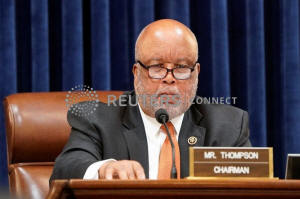|
U.S. lawmaker says tech companies must
quickly remove violent content after New Zealand
 Send a link to a friend
Send a link to a friend
 [March 20, 2019]
By Diane Bartz and David Shepardson [March 20, 2019]
By Diane Bartz and David Shepardson
WASHINGTON (Reuters) - Following the
live-streaming on social media of the mass shooting in New Zealand, the
chair of the U.S. House Committee on Homeland Security wrote a letter to
top executives of four major technology companies urging them to do a
better job of removing violent political content.
In a letter dated Monday and released on Tuesday, Representative Bennie
Thompson urged the chief executives of Facebook Inc , Alphabet Inc's
Google, which owns YouTube, Twitter Inc and Microsoft Corp to more
swiftly remove content that would spawn political extremism.
The letter follows the fatal shootings of 50 worshippers in two mosques
in Christchurch last week. The shooter, a suspected white supremacist,
live-streamed the killings on social media, where it was widely shared.
"Your companies must prioritize responding to these toxic and violent
ideologies with resources and attention," Thomson wrote. "If you are
unwilling to do so, Congress must consider policies to ensure that
terrorist content is not distributed on your platforms, including by
studying the examples being set by other countries.

"The video was widely available on your platforms well after the attack,
despite calls from New Zealand authorities to take these videos down,"
he wrote.
Facebook said it removed 1.5 million videos showing the attack in the
first 24 hours after it occurred.
Thompson also asked the companies for a briefing on the matter.
A Facebook spokesman said the company "will brief the committee soon."
Microsoft said late Tuesday it had received "the chairman’s letter and
we’re ready to work with him, the committee, and with others to address
the issues he raises." Google said Tuesday since the shooting in New
Zealand "we’ve removed tens of thousands of videos and terminated
hundreds of accounts created to promote or glorify the shooter."
The company added that "the volume of related videos uploaded to YouTube
in the 24 hours after the attack was unprecedented both in scale and
speed, at times as fast as a new upload every second." In response,
Google took several steps "including automatically rejecting any footage
of the violence, temporarily suspending the ability to sort or filter
searches by upload date, and making sure searches on this event pulled
up results from authoritative news sources."
[to top of second column]
|

Homeland Security Committee Chairman Bennie Thompson (D-MS) listens
to testimony from Department of Homeland Security Secretary Kirstjen
Nielsen during a House Homeland Security Committee hearing on “The
Way Forward on Border Security” on Capitol Hill in Washington, U.S.,
March 6, 2019. REUTERS/Joshua Roberts?

Twitter did not immediately respond to requests for comment.
Senator Ron Wyden, an Oregon Democrat who has been critical of
Facebook for privacy lapses, said on Tuesday that the government
should tread carefully in reining in tech companies for fear of
aiding dictators and other bad actors.
Wyden warned against revoking protections given in Section 230 of
the Communications Decency Act that specifies tech companies are not
responsible for what users say on their platform.
"If politicians want to restrict the First Amendment or eliminate
the tools with which much of the world communicates in real time,
they should understand they are also taking away the tools that bear
witness to government brutality, war crimes, corporate lawlessness
and incidents of racial bias," Wyden said in a statement.
The Electronic Frontier Foundation (EFF), a nonprofit that advocates
for civil liberties in the digital world, cautioned policymakers
last week not to rush to regulate speech on online platforms or else
it could "disproportionately silence" the most vulnerable users,
such as Egyptian journalist Wael Abbas, who was kicked off YouTube
for posting videos on police brutality.
EFF also called for guidelines that urge social platforms to be
transparent about how many posts and accounts they remove, and give
users notice and a chance to appeal if one of their posts is taken
down.
(Reporting by Diane Bartz; Additional reporting by David Shepardson
and Sarah Lynch; editing by Bill Berkrot and Lisa Shumaker)
[© 2019 Thomson Reuters. All rights
reserved.]
Copyright 2019 Reuters. All rights reserved. This material may not be published,
broadcast, rewritten or redistributed.
Thompson Reuters is solely responsible for this content.
 |